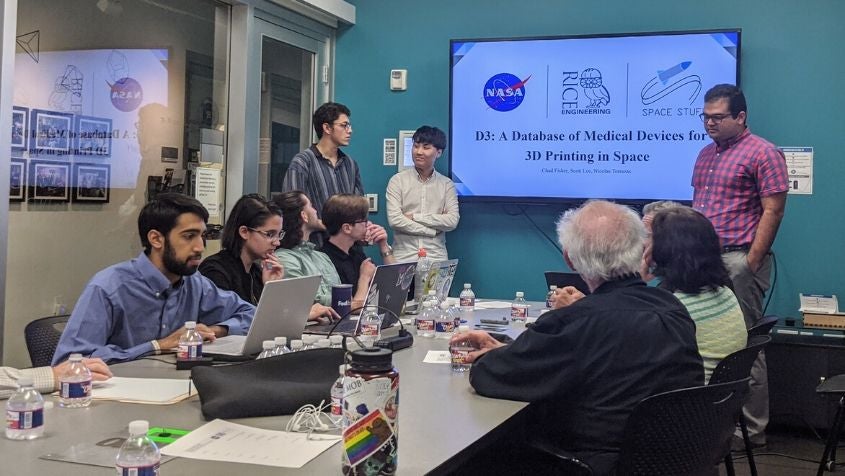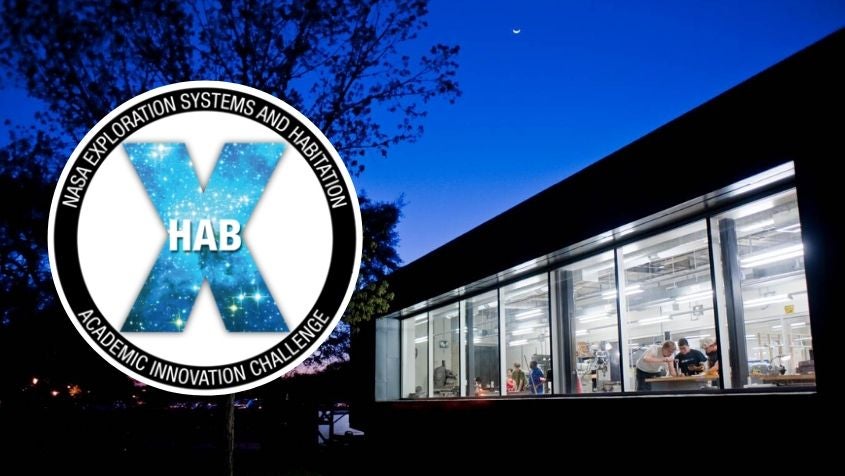On Nov. 21, four retired engineers from the National Aeronautics and Space Administration (NASA) visited the Oshman Engineering Design Kitchen to review the projects of two senior design teams participating in the eXploration Systems and Habitation (X-Hab) 2020 Academic Innovation Challenge.
The NASA engineers invited to the review were Norman Chaffee, Lonnie Jenkins, Renee Lance and Bernard Rosenbaum. Their experience at NASA spans almost six decades across numerous departments, engineering specializations and successful NASA missions, including Gemini, Apollo, Skylab, Apollo-Soyuz and Space Shuttle flights.
The two Rice senior design teams chosen for the challenge are Live Long & Printer whose members are mechanical engineering (MECH) majors Tori Joshi, Oliver Lopez, Colin Nyhus and Paraksh Vankawala, and Space Stuff, whose members are MECH majors Scott Lee and Nicolas Terrazas and bioengineering major Chad Fisher.

The Rice teams were challenged to design a core shapefile repository that will enable 3D-prototyping in space. They are exploring ways to develop a repository of 3D shapefiles as a practical tool for just-in-time problem-solving, including basic and everyday repair and maintenance needs on the space station and in deep space. The teams have also selected space shuttle and medical tool kit parts which they will be redesigning during the course of the year. The parts will be redesigned with the in-space manufacturing capabilities in mind: reduced load and thus minimizing material utilized. Mechanical testing and designing for ergonomic considerations will follow.
“I’m spearheading the database portion of our project and I’m enjoying learning new skills in such a supportive environment. This is very ‘real-world’ and will definitely assist in whatever career I go into,” said Fisher of Space Stuff.
Chaffee, Jenkins, Lance and Rosenbaum shared their insights with the teams, both detailed technical observations and potential in-space scenarios, and information that helped the students place their work in the broader context of NASA’s engineering process.
In May, Rice University was selected as one of 11 university teams to design systems, concepts and technologies to potentially support the agency’s deep-space exploration capabilities. Other universities chosen include the University of Michigan, Auburn University and the University of Miami.
“The X-Hab challenge enables NASA to gain innovative approaches from university teams in concert with NASA expertise,” said John Guidi, deputy director for Advanced Exploration Systems at NASA Headquarters in Washington. “In return, the students are learning genuine hardware and systems engineering development processes that will carry over into their professional careers.”
The teams will present their final design projects and findings in May 2020. Design instructors Sabia Abidi and Matthew Wettergreen, as well as Jimmy Wu of Baylor College of Medicine and NASA’S Mike Fiske, Robert Guzowski and Mark Jernigan, are mentoring the teams.

